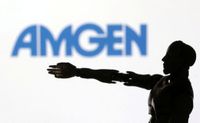On Monday, April 14, 2025, Swiss generic drug manufacturer Sandoz announced that it has filed an antitrust lawsuit against Amgen in the United States. The lawsuit centers around the alleged entrenchment of Amgen's market position regarding its blockbuster medicine, Enbrel (etanercept). Sandoz claims that Amgen has blocked competition from more cost-effective biosimilar competitors, including its own etanercept biosimilar, Erelzi, by unlawfully purchasing and using certain patent rights to maintain its dominant market position.
According to Sandoz, the lawsuit, which was submitted on Friday, April 11, 2025, alleges that Amgen has utilized a "thicket of patents" to protect its monopoly for Enbrel through 2029, in violation of U.S. federal antitrust law. This legal action was filed in a federal court in Norfolk, Virginia, and it accuses Amgen of "reaping billions in profits while denying purchasers and patients access to the lower prices they would have paid in a competitive market, where Sandoz was able to launch." The financial implications of this situation are significant, as Sandoz states it is losing out on millions of dollars in sales each month while being sidelined by Amgen's alleged illegal activities.
In 2024, Enbrel generated a staggering $3.3 billion in revenue in the United States, underscoring the importance of this market for both companies. Etanercept is a critical medication used to treat a variety of inflammatory diseases, including rheumatoid arthritis, making the stakes in this legal battle even higher for patients and healthcare providers alike.
Sandoz received approval from the U.S. Food and Drug Administration (FDA) for Erelzi in 2016, the same year it launched the medication in Europe. With this new lawsuit, Sandoz is seeking an injunction to prevent Amgen from continuing to use its patent rights to block biosimilar competition, allowing Sandoz to launch Erelzi as soon as possible. Additionally, Sandoz is pursuing damages as part of its legal strategy.
Amgen has yet to respond publicly to the lawsuit, leaving many in the industry awaiting its next move. The outcome of this case could have far-reaching implications not only for Sandoz and Amgen but also for the broader biosimilar market in the United States. If Sandoz prevails, it may pave the way for increased competition in the biosimilar space, potentially lowering costs for patients who rely on these medications.
The legal fight highlights ongoing tensions between brand-name drug manufacturers and generic producers, especially in the context of biosimilars, which are designed to be highly similar to existing biologic drugs. As the pharmaceutical landscape evolves, the outcome of this lawsuit may set important precedents regarding patent use and market competition.
In conclusion, the antitrust lawsuit filed by Sandoz against Amgen is poised to be a significant chapter in the ongoing dialogue about drug pricing, market access, and the future of biosimilars in the U.S. healthcare system. Stakeholders from various sectors will be closely monitoring the proceedings as they unfold, eager to see how this legal confrontation will reshape the competitive landscape for biosimilars and the patients who depend on them.





